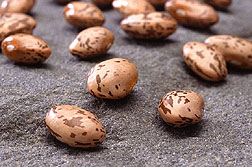This page has been archived and is being provided for reference purposes only. The page is no longer being updated, and therefore, links on the page may be invalid.
Read the magazine story to find out more. |
|
Culprit Compounds That Block Beans' Healthful Iron Probed
By Marcia WoodSeptember 24, 2009
Familiar beans like reds, whites and pintos are rich in iron, a nutrient essential for our health. But not all of the little legumes' treasure trove of iron is bioaccessible—that is, available for our bodies to readily absorb.
In ongoing investigations, Agricultural Research Service (ARS) animal physiologist Raymond P. Glahn and Cornell University co-investigators are discovering more about natural compounds in foods that increase or, problematically, decrease absorption of iron from those foods. Glahn is based at the ARS Robert W. Holley Center for Agriculture and Health in Ithaca, N.Y.
Earlier this year, Glahn, along with former ARS research plant physiologist Ross M. Welch—now retired and working as a collaborator with the Ithaca laboratory—and their university collaborators began tests with poultry as a followup to experiments that relied on Caco-2 human digestive system cells, cultured in petri dishes.
One current study with poultry builds upon a Caco-2 study from several years ago in which Glahn, Welch and colleagues determined that a natural compound known as kaempferol may be a key culprit in decreasing absorption of iron from red and pinto beans.
Kaempferol belongs to a class of natural substances known as polyphenols. Though scientists have known for decades that polyphenols interfere with absorption of iron from beans, the Ithaca study was apparently the first to pinpoint a specific polyphenol in beans as a possible major player.
There's another side to polyphenols, however. They are antioxidants, and thus are potentially important food components, according to Glahn. So, the scientists are investigating them further.
The Ithaca research is highlighted in the September 2009 issue of Agricultural Research magazine. Scroll down to the title beginning "A New Slant on Sustainability."
ARS is the U.S. Department of Agriculture's principal intramural scientific research agency.

